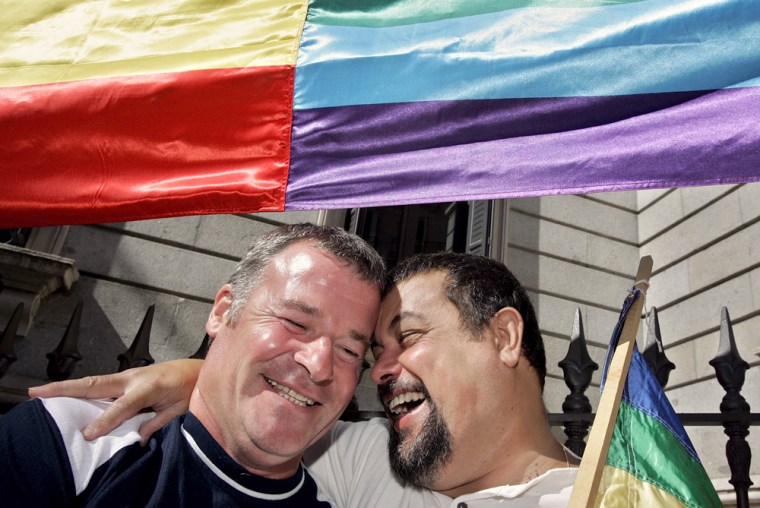Spain became the third country to legalize gay marriage Thursday in a parliament vote that left gay activists blowing kisses to lawmakers and the powerful Catholic Church issuing veiled calls for defiance.
The new law increases the chances of happiness for "our neighbors, our work colleagues, our friends, our relatives," said Prime Minister Jose Luis Rodriguez Zapatero.
The 350-seat Congress of Deputies, by a vote of 187-147 with four abstentions, approved the measure to give homosexual couples the same rights as heterosexual ones, including the right to adopt children.
After the tally was announced, activists watching from the spectator section of the ornate chamber cried, cheered, hugged each other, waved to lawmakers and blew them kisses.
"This is a disgrace," shouted several members of the conservative opposition Popular Party, which vehemently opposed the bill. Those in favor stood and clapped.
‘Historic day’
Outside the stately 19th-century chamber where other chapters of Spanish history have been written, activists jumped for joy and waved rainbow flags symbolizing the international gay rights movement.
"It is a historic day for the world's homosexuals. We have been fighting for many years," said Beatriz Gimeno, a longtime leader of the gay rights movement in Spain. "Now comes the hardest part, which is changing society's mentality." She blinked back tears as she hugged her partner, Boti Garcia.
Oscar-winning Spanish film director Pedro Almodovar, who is gay, said 21st century families don't have to reflect the traditional Catholic model.
"I don't like marriage. I am not going to get married," he said. "But it is important for this to be called marriage so people know that it is the same thing for everyone."
Church condemns decision
The Roman Catholic Church, which held much sway over the government just a generation ago when Gen. Francisco Franco was in power, was left smarting from the vote.
"Marriage, understood as the union of a man and a woman, is no longer provided for in our laws," the Spanish Bishops Conference said after the vote, referring both to the gay marriage law and a bill passed Wednesday making it easier for Spaniards to divorce.
"It is necessary to oppose these unfair laws through all legitimate means," a conference statement said, alluding to its hint last month that town hall officials who oppose gay marriage should refuse to preside over such ceremonies.
Some 80 percent of Spaniards consider themselves Catholic. However, polls say nearly half the country's Catholics rarely go to Mass, and a third say they are simply not religious.
The bill, which became law immediately, says: "Matrimony shall have the same requirements and effects regardless of whether the persons involved are of the same or different sex."
Gay couples can get married as soon as the law is published in the official government registry — as early as Friday or within two weeks at the latest, parliament's press office said.
The Netherlands and Belgium are the only other two countries that recognize gay marriage nationwide. The Netherlands lets gays adopt children. Belgium is considering the adoption issue.
Canada's House of Commons passed legislation Tuesday that would legalize gay marriage by the end of July as long as the Senate also passes the bill, which it is expected to do.
In the United States, Massachusetts is the only state to recognize gay marriage. Vermont and Connecticut have approved same-sex civil unions.
In debate before the vote, Zapatero said the dry language of the Spanish reform masks "an immense change in the lives of thousands of citizens. We are not legislating, ladies and gentlemen, for remote, unknown people. We are expanding opportunities for the happiness of our neighbors, our work colleagues, our friends, our relatives."
Zapatero lacks a majority in the chamber but got more than enough help from small regional-based parties that tend to be his allies.
Country divided
Popular Party leader Mariano Rajoy said Zapatero has deeply divided Spain and should have sought a consensus in parliament that recognized same-sex unions but didn't call them marriages. Rajoy said if the vast majority of countries don't accept gay marriage, there must be a reason.
"I think the prime minister has committed a grave act of irresponsibility," Rajoy said, adding that his party is considering challenging the law before the Constitutional Court, Spain's highest tribunal.
The gay marriage bill was the boldest and most divisive initiative of the liberal social agenda Zapatero has embarked on since taking office in April 2004.
Under the divorce law reform, couples can end their marriage without a mandatory separation period or having to state a reason for the split-up, as required under the old legislation. Zapatero also pushed through legislation allowing stem-cell research and wants to loosen Spain's restrictive abortion law.
In its first display of anti-government activism in 20 years, the Catholic Church endorsed a June 18 rally in which hundreds of thousands of people marched through Madrid to oppose the same-sex marriage bill.
Still, polls suggest Spaniards support gay marriage. A May survey by pollster Instituto Opina said 62 percent of Spaniards support the government's action on gay marriage, and 30 percent oppose it. But surveys also show Spaniards about evenly split over whether gay couples should be allowed to adopt children.
